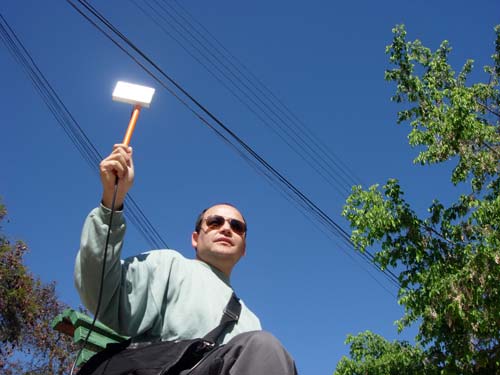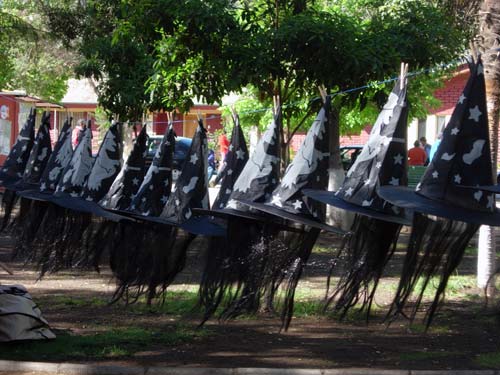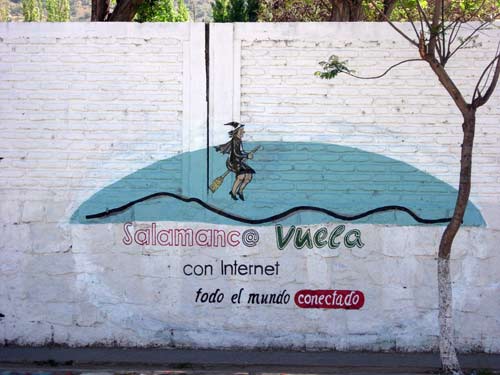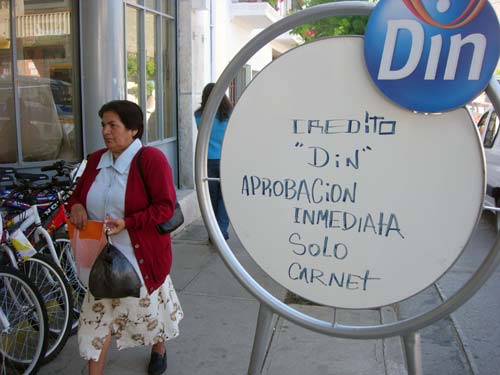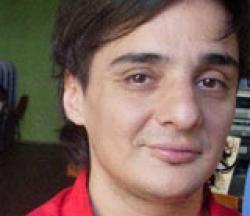At first glance, Benjamín Franklin Silva Donoso is the quintessential computer geek. He is thirty-four and lives with his parents. Long days inside the family home have left him pasty. He would like to have a girlfriend, but it’s not easy, he explains, because the women in Salamanca, his Andean town, are always going off in the cars of the mine workers. He’s been chatting online with a woman from Santiago, but they haven’t met yet. He is often depressed and suffers from bad headaches. Sometimes he does not leave the house for days at a time.
And yet, like his namesake, Benjamín Franklin is part of a revolutionary movement that is modernizing the lifestyles of his neighbors, including how they communicate with one another and the outside world. Salamanca, a small town in northern Chile, has become the first community in Latin America with free and universal wireless internet access, all thanks to Wi-Fi technology. Benjamín has invented a new antenna to facilitate this connection no matter where you are in the town. When I meet him in the central square, he is wearing dark sunglasses and jeans, as well as a hat—which may explain the pale complexion. He is carrying an antenna.
“Hello, I’m Benjamín,” he says, timidly offering me his hand.
Since my arrival in Salamanca, several people have told me about the town’s very own Benjamin Franklin and his inventions, and I tracked him down through a secretary at City Hall. These days, the arrival of a journalist to Salamanca is practically an event in itself. Local authorities make themselves available to you; secretaries of important officials become your personal assistants. All thanks to the internet.
Benjamín Franklin shows me his latest invention: a handcrafted antenna that facilitates connection to a wireless internet signal. For around twenty dollars, the price of the antenna, Benjamín guarantees marked improvement in connection to the net. In three months, he has sold more than ten antennas, earning the equivalent of two hundred dollars—two bills on which the face of the original Benjamin Franklin appears. Since then, he has been able to live exclusively off the profits from his invention. Interestingly, the internet has brought Benjamín and me together in more ways than one. I am connected to him already by this: our livelihoods depend on the same tool. Without e mail access, I would never be able to function as a traveling journalist.
Benjamín’s invention has brought him a great deal of publicity. He explains proudly that, in the last few months, he has been interviewed by a handful of television channels, two radio stations, and newspapers with a national circulation. In addition, on October 12, 2006, he appeared on the cover of La voz del Choapa, a small newspaper from Illapel, Salamanca’s large neighboring city. And now, he tells his story to me.
Benjamín Franklin speaks slowly, recalling how he has always liked inventions. Long before the appearance of the internet and wireless technology in Salamanca, when it was still isolated from the rest of the country, Benjamín designed his first antenna. This was in the early nineties, when, in Salamanca, the notion of a worldwide web of communication still seemed like something out of science fiction—when computers, like giant robots, operated mysteriously in distant skyscrapers and people were content to listen to the radio. In fact, the first antennas Benjamín invented were for capturing radio signals from the capital, Santiago. Benjamín has not yet considered patenting his latest invention, but, as always, he is busily working on future improvements to its design.
* * * *
In Plaza de Salamanca, surrounded by children chasing soccer balls and old-age pensioners chasing nothing at all, Benjamín tells me that here people listen mostly to peasant music, cumbias and rancheras.
“I don’t think that kind of music is inferior,” he explains carefully, “it’s just that I like English music much more. I like the classics—The Beatles and Creedence Clearwater Revival. That’s why I invented my first antennas, so I could listen to them.” This was the first success that kicked off his life as an inventor, but considering his illustrious name, he must have been destined to be an innovator from birth.
The story of how he came to be called Benjamín Franklin begins in the first decade of the twentieth century. It was then that Benjamín’s grandfather, Pedro Silva Contreras, set out to see the world as a sailor on a training ship in the Chilean navy. On one of those journeys, a century ago, the ship docked in New York.
“My grandfather sailed around the world four times, but he liked the United States best,” Benjamín tells me. “He always talked about New York, how one time he went up to the top of the Statue of Liberty.”
In fact, Benjamín’s grandfather liked the United States so much that he baptized his sons with names such as Washington, Edison, and, in the case of Benjamín’s father, Franklin. Following this tradition, Franklin christened his son Benjamín Franklin, after the famous inventor.
Like a shadow, Benjamín’s elderly father edges up to our conversation. He has gray hair, pale eyes, and is nearly toothless. It seems he did not want to miss his son’s appointment with a reporter. Both he and Benjamín’s mother are artisans, woodworkers who sell their wares in the main square. Before the arrival of the internet, Benjamín used to help his parents build and sell their products. But, like so many others before him, when the internet came along he dropped everything for technology.
“My son has always been an inventor, just like the other Benjamín Franklin,” Franklin Silva says. “I don’t understand internet, I don’t know anything, but I can see what my son is doing is very important because it connects him with the rest of the world. My father went around the world four times on a boat. Now my son is doing the same thing with internet, only he does it from home.”
While Benjamín’s father shares his opinions, his son, Benjamín Franklin Silva Donoso, looks out toward the mountains of the Andes range thinking, perhaps, of his next experiment. Or maybe he is thinking of his grandfather, the sailor. Or maybe he is simply surprised by his father’s public display of pride.
* * * *
Founded in 1844, Salamanca has a pre-Hispanic past evident in its inhabitants, partial descendants of the Incans and Diaguita Indians. Life in Salamanca is peaceful, quiet. Here one can see families on bicycles, children walking to school, police greeting neighbors, dogs walking without their owners, parked cars with the windows left open. There are few taxis, hardly any traffic lights, and it has been several weeks since the services of the local fire department were needed. A municipal swimming pool, an arena, a gym, and two discotheques open only on weekends serve as the town’s entertainment. An old yellow truck with loudspeakers coasts by announcing a ranchera festival at full volume. Some youths are playing guitar in the square. There are few streets in the center of town, and Salamanca has just two automatic tellers: one at a filling station, the other in the only bank branch in the city. Despite being the first community in Latin America with free wireless internet access, most of the time Salamanca feels old-fashioned, unconnected, and charmingly acoustic.
The last stretch before reaching the city, located 316 kilometers north of Santiago, is a seemingly interminable series of curves and switchbacks, of steep rises and falls through foothills riddled with narrow, dangerous valleys. The bus pulls into town slowly, its motor still straining, and one has the sensation of entering a hidden, isolated region, a forgotten place. The majority of the bus passengers are workers from Los Pelambres, a modern, privately owned copper mine. With 40 percent of the planet’s copper reserves, Chile is the world’s main producer of the metal. In recent years, copper production has risen sharply due to a global boom in copper wiring, a sector that, paradoxically for Salamanca, would plummet in a wireless world.
Before making news as the first municipality in Latin American with Wi-Fi, Salamanca was legendarily known for a different, less technological kind of magic. People believed it was a place of witches. Salamanca is covered with drawings of airborne witches atop brooms—on walls, in stores, on advertisements for restaurants and other businesses. To most people, wireless communication seems like a kind of magic: it’s inexplicable to the layperson and can only be manipulated correctly by experts like Benjamín Franklin. With his antennas, dark glasses, and misanthropic tendencies, he does seem like a kind of magician. Carl Sagan, PBS’s favorite scientist, once said that we live in a society heavily dependent on science and technology, yet nobody knows a thing about them. Benjamín and the other citizens of Salamanca seem to be learning the secrets.
“Everyone says there are witches here, but I’ve never seen one,” says Roxana Pizarro, a young woman who works for City Hall and listens to radio stations from Santiago via the internet. “In any case, it’s what identifies the city in the rest of the country. Or what used to identify it. Now we’re known for having Wi-Fi.”
The free-internet project for this small, isolated Chilean town was called Salamanca sale al mundo, which translates roughly as “Salamanca steps out into the world.” A witch straddling a broom appeared alongside the slogan.
Salamanca’s 25,000 inhabitants might have believed the arrival of wireless technology would bring a supernatural transformation to their little town. Instead, despite the installation of eleven antennas capable of emitting signals without cables, the city mostly went on with its humdrum life, the economy still neatly divided between mining and agriculture. Yet news of the experiment traveled fast and, before long, had spread beyond Chile. Several Salmantinos recall how days after the official inauguration of the free signal, on September 4, 2006, news of the event was already being broadcast by CNN en Español throughout Latin America and the United States. From the station’s studio in Atlanta, Carolina Escobar opened the broadcast enthusiastically, informing viewers, “A small city in Chile has become the first place in Latin America with free wireless internet access. The experiment hopes to boost the capacities of the town’s inhabitants with such internet advantages as, among others, free content, digital literacy, and the ability to upload material.”
Not even a month after the project’s inauguration, Salamanca, once an invisible Andean town in the north of Chile, was stepping out into the world as a leader in Latin America.
* * * *
Salamanca City Hall sits directly in front of the main square. To get to the mayor’s office one must walk down a dimly lit corridor, where civil servants occupying several desks greet you silently by raising their eyebrows. Today, all the computers in City Hall are connected to the internet, and on the mayor’s desk is a powerful wireless notebook. A conference table in the mayor’s office is stacked with blueprints; they are planning to renovate the main square of the city. Despite the daylight flowing in, the lights in the office are on. Everywhere I look there are signs of fast-paced modernization. Mayor Gerardo Rojas, forty-three, a lawyer and native of Salamanca, is bald and speaks in a high-pitched voice. He is a recent divorcé—“recent” because Chile is a conservative country that passed divorce laws in 2004.
The mayor is openly enthusiastic about the project, and my questions are almost unnecessary to start him talking about it.
It all began, he explains, when he was reading an interview with Senator Fernando Flores in a national newspaper. The senator was talking about blogs, and in the interview he said that any town interested in doing something with technology should contact him. The idea kept buzzing around the mayor’s brain. Some mornings he would wake up wanting to call the senator; other times he assumed it was useless, since any help Salamanca would get would be minimal.
Two months passed. Then, one day:
“I said to myself, ‘I’m going to call,’ thinking I’d just see if there were any opportunities left. As it turned out, nobody had phoned. Not a single person.”
The senator put him in contact with his foundation, Mercator, the mayor continues excitedly. Several days later, the first team of Mercator technicians arrived in Salamanca. At the first meeting, and with little delay, they were discussing providing the town with Wi-Fi. This was in June 2006. Only three months later, the president of Chile was inaugurating the free signal.
The mayor himself says that being first makes Salamanca special. But he insists that the project was never meant as a competition with rest of the country; no one anticipated the publicity that would come. And yet, he admits that being number one has raised the self-esteem of the entire town.
Chile has long known the benefits of being first. That international news places Chile at the top of different rankings in Latin America is not only commonplace but also a source of national pride. The traumatic years of the military dictatorship, when traveling with a Chilean passport meant having to wait extra hours in airports across the world, seem part of the very, very distant past. In a country guilty of human rights violations, Chileans, in less than twenty years, have assumed the continental role as the pride of Latin America, a position based primarily on economics.
Headlines in diverse media over the past few months appear to confirm this trend. The World Economic Forum’s annual report recently announced, “Chile continues to lead Latin America in competitiveness.” In its Doing Business 2007 report, the World Bank states that “Chile continues to lead Latin America in investment climate.” Moreover, a report by FedEx identifying countries with the easiest interaction and exchange between individuals, companies and other nations notes, “Chile is at the top of the list in Latin American with respect to openness.” And finally, Transparency International’s 2006 Corruption Perceptions Index identifies Chile as the “leader in Latin America in the fight against corruption.”
The country’s sense of national pride has been generating regional animosity for some time now.
“We’re the first in Latin America, and nobody can deny it,” Mayor Rojas says, with an inescapable touch of hubris.
It is after lunch. The mayor and I are drinking coffee while most of the city is taking a siesta. Mid-conversation, Mayor Rojas stops to acknowledge that Salamanca’s wireless connection is not perfect. The connection problem has three components, he explains: first, the installation of antennas that do not provide universal coverage to the zone; the second matter concerns digital mobility, which is to say, training people to use the technology; third is the creation of a municipal blog.
From his desk drawer, the mayor removes some photocopies and begins to read aloud from them. In January, a new course in rudimentary technological literacy will be offered to 4,800 people. Volunteers from Santiago had offered more limited instruction in the past. Benjamín Franklin attended one of those sessions, which was held at the local high school. While Benjamín learned a lot, he says that he would like to learn more.
“We’re also working on an agreement with the United States Embassy about the matter of learning English,” the mayor says. He is proud of this fact, just as Chile was proud when, in 2004, ex-president Ricardo Lagos signed the first free-trade agreement between the United States and a South American country.
When I ask the mayor to name a concrete benefit he thinks the net will bring to Salamanca, I am thinking of the changes the internet has brought to my own life. I can’t fault Benjamín Franklin for his nerdiness, considering I also spend most of my days glued to a computer screen, using electronic mail as a virtual office. For the mayor, though, the changes have been of a different character. Today Salamanca is thriving, he says, and this aspect of the project has been good. He then mentions a recent report on the national news about all of Shanghai becoming equipped with Wi-Fi. One of the newscasters commented, “Yes … but we have Salamanca.”
The project “Salamanca steps out into the world” might be financed, at least in part, by the local municipality, but it would not be possible without an alliance with the Pelambres Mining Foundation (FMP) and the assistance of the management and digital mobilization services of the Mercator Foundation, led by Senator Fernando Flores. The mayor and the senator are active in the same political party, the Party for Democracy (Partido por la Democracia), founded by ex-president Lagos in the final years of the Pinochet dictatorship.
“Will there be absolute freedom on the internet?” I ask.
“There are restrictions on sex and music,” the mayor answers. “But on nothing else.”
It is a technical matter, he explains, as downloading this type of material would result in heavy internet traffic. But a few minutes later, the mayor concedes that the filters are not working yet. He repeats that the aims of the project are not censorial—they are to educate, to speed up information-processing procedures, and to help Salamanca connect with the world. Ironically, as any fourteen-year-old boy with a laptop can tell you, this is a world in which music and pornography are the targets of most internet connections.
* * * *
Walking its nearly vacant streets, a laptop in tow, I imagine what September 4, 2006, must have been like. Early that festive morning, the president’s security team was securing every entrance and checking every corner of the municipal gym. Photographers cleaned their lenses. Members of the public school’s marching band tuned their instruments for the parade. Officials and journalists checked into hotels. In a few hours, President Michelle Bachelet, the first woman to become president of Chile, would officially inaugurate free internet access for all Salamanca.
Albert Einstein once said that the word progress has no meaning while there are still unhappy children in the world. That morning, marching past the dignitaries, the children of Salamanca certainly seemed happy. Inside the city arena, the stands were packed with people anxious to hear the programmed speeches. The national news was broadcasting the event live.
“The president’s coming was vital in making this a success. It really brought us a lot of recognition,” the mayor recalled.
“I didn’t go, but it was good that she came,” said Benjamín Franklin Silva Donoso. He remembered the excitement that descended upon the town that day: the blocked streets, the police cordoning off the area, the security apparatus for which Salamanca was not prepared. For a withdrawn, quiet person like Benjamín Franklin, the festivities were too much.
When the president took the stage, the room was packed.
“It is clear to me these tools cannot remain centralized,” the president began, her voice booming out of the speakers of the large space. “They must not remain limited to the large cities but must spread, as we are seeing here, to every region, city, town, and corner of the country.” According to the president, if access to technology is not guaranteed to everyone “we run the risk of deepening the inequalities that already exist in our country.”
At the close of the inauguration ceremony, Scarleth Cárdenas, of Televisión Nacional de Chile, began her live broadcast to the rest of the country. “Before Paris, New York, or Buenos Aires,” she reported, “Salamanca is soaring with free internet.”
In being first, Salamanca was taking a big risk. Just a year earlier, another Chilean city had made the same announcement and the project had failed. And while no one mentioned it publicly on the day of the inauguration, many people recalled a similar ceremony in 2005, in the southern city of Puerto Montt. That day, former president Ricardo Lagos inaugurated Puerto Montt as the first city with Wi-Fi in the country. The BBC portal announced the news to the world, and yet one technical mishap after another brought the project to an abrupt halt, extinguishing Puerto Montt’s hopes to be “number one.” So, in a country obsessed with rankings, Salamanca stepped in to take the disappointed city’s place, though not without its own share of difficulties.
The first problem concerned the use of weak antennas. Even today the antennas do not provide coverage for the entire zone. But there is at least one person in this story who is happy about the troubles Salamanca is having. This is because he has been able to offer a solution to the flaws in the system. His name, of course, is Benjamín Franklin Silva Donoso.
* * * *
If you don’t own a computer in Salamanca, one dollar will get you an hour’s worth of internet in one of the two cybercafes situated in front of the main square. The majority of the customers are children playing online games with each other, mostly trying to shoot or stab each other in computer-simulated combat. The rest of the clientele send or read e-mails or “chat,” and rarely use the web for anything else. One of them is chatting with a friend, who lives two blocks away, about their homework. Next to me, an elderly woman is writing an e-mail to her sister in Santiago. She says she uses the computer only to consult her e-mail and prefers listening to the radio to keep informed. She has read a newspaper from Santiago online only once and has never visited the website of a foreign-language paper. Despite being potentially connected to a global culture, people seem most interested in communicating with the people already close to them.
Small shops in Salamanca sell refurbished computers, but the bulk of computer sales are made by DIN, a department store that is part of a holding company with branches throughout the country. On display at the Salamanca branch are bicycles, washing machines, televisions, and, of course, computers. A large poster advertising Wi-Fi serves as the sales hook in Salamanca. Here residents have had to get used to the powerful influence of a technology that is growing worldwide and promises to cover the biggest cities in the world.
In a corner of the shop—really just a storehouse stuffed with merchandise—is the director of the Salamanca branch, Gonzalo Basualto. Born in Valparaíso, Gonzalo is thirty-one and has been living in Salamanca for little over a year. Not being able to see the ocean every day is disconcerting for him, and he still has not grown accustomed to being surrounded by so many mountains. His wife accompanied him to Salamanca; their daughter stayed behind in Valparaíso, because of her studies.
Gonzalo does not have to say it for one to realize that computers are the store’s star items. The phenomenon may be national (last year, broadband connection in Chile rose 40 percent, reaching nearly one million subscribers in a country with a population of 16 million), but in Salamanca, the obsession with technology seems to have reached a fever pitch. There are no notebooks left in the city—the forty in stock at the store having sold out in less than three weeks. Ever since the appearance of Wi-Fi, customers seem to be interested in one thing only—computers.
Gonzalo Basualto has slicked-back hair and is wearing a white shirt with a name tag bearing his photograph. He tells me that the majority of his customers buy on credit. Salamanca is among the cities with the best salaries in the country, and to get credit all one needs is an identity card. A study made by a university in Santiago found that 12 percent of Chilean households owe ten times more than they earn. For Gonzalo Basualto, however, this is not a cause for concern, and he points out that a notebook can be purchased in Salamanca on a twenty-four-payment installment plan. Although Salamanca is a small city, the store’s marketing campaign was carried out on a grand scale. The campaign was exclusive to the municipality, and computer models were christened with names such as Salamanca and Pelambres.
“Nine out of ten computers that we sell come equipped with Wi-Fi,” Gonzalo says, adding that the installation of the wireless network in Salamanca has brought personal surprises for him as well.
Two weeks ago he attended the annual convention of DIN branch directors at the Espacio Riesco Convention Center in Santiago. Gonzalo and some other directors were taking a coffee break when several colleagues came over and, one after another, began congratulating him for having appeared on television. “They told me I was the Man of the Year,” he recalls. “It made me laugh, and it also made me feel very happy.”
* * * *
I am staying at the Hotel My House, on Avenida Infante. Engineers who come to work in Los Pelambres often stay here, and when I checked in the receptionist asked if my visit is related to the mine. In Salamanca, working for the mine commands particular respect.
The front desk does not have Wi-Fi, but it does have wideband internet connection. During my stay, the internet is used mostly by the owner’s children to do their homework. The hotel is new, with floral curtains and a spacious bathroom, and it sits in front of the city arena. Whenever I turn my computer on, two antennas pick up the signal. I can see them through the window, close by, and there is no interference or any trees in sight; which is to say, connecting to a wireless internet from the hotel should not be difficult.
According to the municipal authorities, trees are the main cause of signal interference in Salamanca. What is really needed, the mayor says, is WiMAX. WiMAX is more advanced than Wi-Fi, yet the technology is still being developed.
“All of this has caused a lot of fuss, but the truth is, things haven’t really changed much because of internet,” owner of Hotel My House says. “What really matters is all the publicity.”
Despite problems with connection, Wi-Fi fever persists. In fact, the obsession with being the first to adopt internet technology, and thus to be “first” in Latin America, is still prevalent throughout the country. In 2006, two representatives of the Partido por la Democracia proposed amending the constitution to include internet access among the fundamental rights of citizens. “The same as access to drinking water and electricity, digital connectivity must be viewed as a basic human right which can narrow social divisions in Chile,” said Esteban Valenzuela, one of the promoters of the initiative, the day the proposal was launched.
“By next September, my goal is for the entire rural sector of the municipality to have coverage,” the mayor ventures. He says this knowing full well that the signal still does not reach many places in town.
I knock on the door of a house advertising handcrafted antennas for wi-fi. It’s three o’clock, and Benjamín looks sleepy when he opens the door. Apparently, I have interrupted his siesta.
This visit lacks the formality of our first encounter in the main square. Benjamín is shirtless, his face bears the marks of the bedsheets, but he is courteous nonetheless. He brings me a chair; he peels an orange, which we share during our conversation.
Benjamín likes nothing more than talking about the internet, and he listens attentively to anything having to do with technology. I tell him that for years I did almost all of my work as a journalist in different cybercafes throughout the world, without any permanent office. All I had to do was enter a cybercafe and contact the publications to whom I offered my work as a freelance reporter. When I tell him I’ve dubbed this kind of writing “portable journalism,” Benjamín repeats the words as if he were memorizing them.
“The truth is,” Benjamín says, “the Wi-Fi coverage doesn’t function the way it should. But with my antenna, it works like a dream.”
Benjamín says this while showing me his workshop. It is here where he cuts plastic pipes, encases them in silver-painted boxes, and performs other technological feats. From the box he then hangs a cable that will ultimately connect to a computer, supplying it with perfect internet access. Like an inventor revealing trade secrets, he presents me with a complex jumble of wires and seems to imply that I should know what they signify. I assume he must be talented at what he does, and pretend to know how and why.
Always close by, Benjamín’s parents soon appear. They speak, simultaneously, about their son, while Benjamín turns back to his work. He takes me to the room where he keeps his computer. The machine sits next to an unmade bed, and the URLs for three porn sites are written on the wall.
“There are already places where you can’t listen to the radio or download music,” he gripes. “They cut the connections there.” In Benjamín’s words is the caged frustration of a person who listens to The Beatles in a town where rancheras hold absolute sway.
* * * *
This cultural monopoly is already changing. Chile is a very different world from the one I left six years ago, an earlier laptop in tow. As I leave Salamanca this time, Benjamín Franklin hands me a piece of paper with his e-mail address—a succinct gesture that symbolizes the ways in which the internet has shaped both our lives. On my way out of the city the bus bumps along unpaved streets, the dirt-grimed windows making it impossible to see outside. Yet Salamanca is there behind me—a small city in a country on a fast economic track; a country where the rates of inequality are rising as quickly as its sunny economic figures; a proud country obsessed with being number one. This is Chile: the first Latin American country to sign free-trade agreements with the United States, the European Union, Japan, and China. Before New York, Paris and Buenos Aires, Salamanca steps out into the world. I try looking back through the window, but the town has already disappeared in a cloud of dust.
Translated by Kevin Krell.

